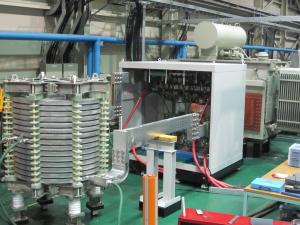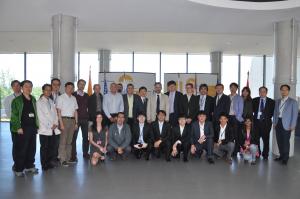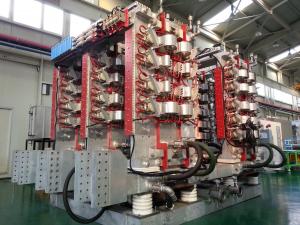Burning the midnight oil for the AC/DC converter
4 Jun 2013
-
ITER Electrical Engineering Division & ITER Korea
Tests are run in Korea on the prototype of the AC/DC power converter for the ITER correction coils ...
"Dear Kookie, please fill out and forward. Thank you." (9:00 a.m., France)
"Dear Caroline, could you confirm... appreciate it" (4:00 p.m., Korea)
"Dear Caroline, could you confirm... appreciate it" (4:00 p.m., Korea)
It's not always highlighted, but the behind-the-scenes work for a successful ITER design review takes endless patience, organization and collaboration across long distances. For Caroline Moller, part of ITER's Electrical Engineering Division, and Kook-hee Moon, part of the Korean Domestic Agency—as well as their colleagues—this often means days that begin very early, or end very late ...
Last week, the Final Design Review for ITER's AC/DC magnet power converters took place from 28-31st May at ITER Headquarters.
Last week, the Final Design Review for ITER's AC/DC magnet power converters took place from 28-31st May at ITER Headquarters.
"Both the Electrical Engineering Division and the Korean Domestic Agency team have made a big effort to get this Final Design Review to go well," says the Technical Responsible Officer for this system for ITER, Hao Tan. "I was impressed by the fast response and good cooperation between the two teams, including working at midnight! It was the first time we prepared the design review meeting according to the new procedure*. Achieving success was possible through strong support and tight collaboration both inside and outside the ITER Organization—a true expression of the Unique ITER Team—which should be a valuable experience for the future."
The AC/DC magnet power converter team. Pictured during the Final Design Review at ITER: Electrical Engineering Division head Ivone Benfatto (centre, beige jacket); KODA Technical Responsible Officer Jong-Seok Oh (to Ivone's right); Kook-hee Moon (second row, third from right); Caroline Moller (first row, first from left); and ITER Technical Responsible Officer Hao Tan (first row, second from left).
"A Preliminary Design Review for the AC/DC magnet power converters was held exactly one year ago, part of the Procurement Arrangement signed by the Korean Domestic Agency in March 2011. The scope of the Procurement Arrangement includes the detailed design of the AC/DC power converter units for the ITER correction coils and vertical stabilization coils. During the preliminary review, interface requirements were clarified, key electrical design parameters were carefully evaluated, factory acceptance test (FAT) items were fully discussed, and site installation procedures and tooling were well investigated. This month, after one year of hard work, everything was ready for the Final Design Review for the correction coil and vertical stabilization power converters. (The Final Design Review of the central solenoid and toroidal field coil power converters is planned for the end of this year).
The new design review procedure applied to the Final Design Review was a challenge for the joint team composed and the industry consortium comprising Dawonsys and Hyosung. Led by Hao Tan, all parties have been working closely together since March when the interface review meeting was finished. Within 80 days, an internal Final Design Review was organized by the Korean Domestic Agency in order to ensure success during the ITER review. The ITER Organization technical team reviewed all of the review documentation in advance before its official submission to make sure all the key points of the design were presented clearly and precisely.
"We were all inhabited by the same desire to succeed at this Design Review," says Caroline. "We exchanged many emails and phone calls to better manage the logistics of the event and to plan for the unexpected. Good team work and communication, the power to listen and respect different cultures ... these are the things that create a positive dynamic and that allow us to move forward calmly and confidently."
Kook-Hee, who acted as meeting secretary, agrees: "For the ITER Organization and the Domestic Agencies, communication is primordial. All participants worked hard for many months in the interest of the project. I cannot deny that the week was very intense, but satisfying. Believe it or not, I miss being at ITER already!"
* New tools are available through the ITER Collaborative Platform (ICP) that aid in the management of a design review, such as a new design review portal and a "Echit" application that facilitates the management of chits.




